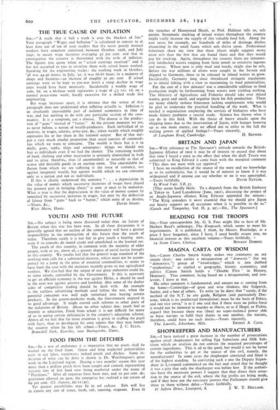FOOD FROM THE DITCHES Sta,—In a war of endurance it
is imperative that no assets shall be wasted on the food front. Great and long neglected potentialities exist in our lakes, waterways; indeed ponds and ditches. Some in- dication of what can be done is shown in Dr. Worthington's great work in the Lakeland region. During a two months' season this year more than a million perch have been caught and canned, representing 150,000 tins of fish food now being marketed under the name of " Perchines." After all expenses have been met, and to per cent. de- preciation allowed on gear, the enterprise has realised a net return of 69 per cent. (Cf. Nature, 29/11/41).
Yet greater possibilities may lie in eel culture Eels will live in almost any sort of water, fresh, salt, running, stagnant. Even in the trenches of Hampstead Heath, as Prof. Haldane tells us, eels persist. Systematic stocking of inland waters throughout the country might vastly increase the supply of this valuable food fish. Along the east coast, for example, are hundreds of miles of drainage ditches abounding in the small fauna which eels thrive upon. Professional fishermen share my view that these places might support many more eels than the few that are found there and that they would pay for stocking. Again, throughout the country there are innumer- able landlocked waters ranging from farm ponds to extensive lagoons and meres. Where now is only mud and weeds, might also be eels. Before the war millions of elvers were caught in the Severn and shipped to Germany, there to be released in inland waters to grow. Incidentally, Germany long since introduced stringent regulations as to inland fishing with a view to maximising its food potentialities.
For the cost of a few minutes' war a considerable addition to food production might be forthcoming from waters now yielding nothing. The Ministry of Agriculture and Fisheries should take over inland waters, great and small, and organise them for fish production. There are many elderly inshore fishermen lacking employment who would be glad to undertake the practical handling of the work. What is needed is organisation employing the services of biologists who have made fishery problems a special study. Science has shown what it can do in this field. With the threat of heavy attacks upon the shipping lanes due to the intervention of Japan, with hunger looming up as one more enemy, can we afford not to enlist to the full the waiting power of applied biology?—Yours sincerely,






















 Previous page
Previous page